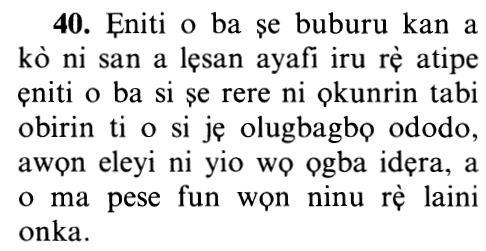40vs40
Select any filter and click on Go! to see results
مَنْ عَمِلَ سَيِّئَةً فَلَا يُجْزَى إِلَّا مِثْلَهَا وَمَنْ عَمِلَ صَالِحاً مِّن ذَكَرٍ أَوْ أُنثَى وَهُوَ مُؤْمِنٌ فَأُوْلَئِكَ يَدْخُلُونَ الْجَنَّةَ يُرْزَقُونَ فِيهَا بِغَيْرِ حِسَابٍ
Man AAamila sayyiatan fala yujza illa mithlaha waman AAamila salihan min thakarin aw ontha wahuwa muminun faolaika yadkhuloona aljannata yurzaqoona feeha bighayri hisabin
Index Terms
Click to play
Yoruba Translation

Hausa Translation
"Wanda ya aikata mummunan aiki to, ba za a sãka masa ba fãce da misãlinsa, kuma wanda ya aikata aiki na ƙwarai daga namiji kõ mace alhãli kuwa shĩ mũmini ne, to, waɗannan sunã shiga Aljanna, anã ciyar da su a cikinta, bã da lissãfi ba."
Asbabu n-Nuzuul (Occasions of Revelation)
Allah says:
مَنْ عَمِلَ سَيِّئَةً فَلَا يُجْزَى إِلَّا مِثْلَهَا ...
Whosoever does an evil deed, will not be requited except the like thereof; (means, one like it).
... وَمَنْ عَمِلَ صَالِحًا مِّن ذَكَرٍ أَوْ أُنثَى وَهُوَ مُؤْمِنٌ فَأُوْلَئِكَ يَدْخُلُونَ الْجَنَّةَ يُرْزَقُونَ فِيهَا بِغَيْرِ حِسَابٍ ﴿٤٠﴾
and whosoever does a righteous deed, whether male or female and is a true believer, such will enter Paradise, where they will be provided therein without limit.
means, the reward cannot be enumerated, but Allah will give an immense reward without end. And Allah is the Guide to the straight path.
" من عمل سيئة فلا يجزى إلا مثلها " أي واحدة مثلها " ومن عمل صالحا من ذكر أو أنثى وهو مؤمن فأولئك يدخلون الجنة يرزقون فيها بغير حساب " أي لا يتقدر بجزاء بل يثيبه الله عز وجل ثوابا كثيرا لا انقضاء له ولا نفاد.
"من عمل سيئة فلا يجزى إلا مثلها ومن عمل صالحا من ذكر أو أنثى وهو مؤمن فأولئك يدخلون الجنة" بضم الياء وفتح الخاء وبالعكس "يرزقون فيها بغير حساب" رزقا واسعا بلا تبعة
يعني الشرك
I'raab - grammatical analysis of the Qur'an
«مَنْ» اسم شرط جازم مبتدأ «عَمِلَ» ماض فاعله مستتر «سَيِّئَةً» مفعول به «فَلا» الفاء واقعة في جواب الشرط ولا نافية «يُجْزى » مضارع مبني للمجهول ونائب الفاعل مستتر «إِلَّا» حرف حصر «مِثْلَها» مفعول به ثان والجملة الاسمية مستأنفة وجملة فلا يجزى في محل جزم جواب الشرط «وَمَنْ عَمِلَ صالِحاً» إعرابها كسابقه «مِنْ ذَكَرٍ» متعلقان بحال محذوفة «أَوْ أُنْثى » معطوف على ذكر «وَهُوَ مُؤْمِنٌ» الواو للحال ومبتدأ وخبره والجملة حالية «فَأُولئِكَ» الفاء واقعة في جواب الشرط واسم الإشارة مبتدأ «يَدْخُلُونَ» مضارع مرفوع والواو فاعله «الْجَنَّةَ» مفعول به والجملة خبر المبتدأ والجملة الاسمية في محل جزم جواب الشرط «يُرْزَقُونَ» مضارع مبني للمجهول والواو نائب فاعل والجملة حال «فِيها» متعلقان بحال محذوفة «بِغَيْرِ» متعلقان بالفعل «حِسابٍ» مضاف إليه
